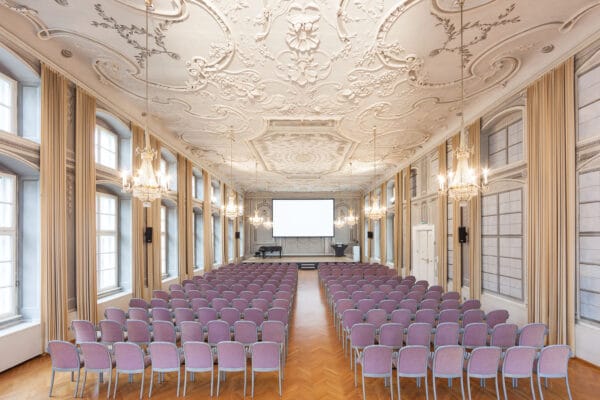
NAME:
Theologie - KLS
BUILDING:
Theologie
FLOOR:
2
TYPE:
Lecture Room
CAPACITY:
173
ACCESS:
Only Participants
EQUIPMENT:
Beamer, PC, WLAN (Eduroam), Overhead, Handicapped Accessible, LAN, Microphones, Light Installation, Sound System, Speaker Desk
The Bundessportheim und Alpine Forschungsstelle der Universität Innsbruck (Federal Sports Centre and Alpine Research Station of the University of Innsbruck) in Obergurgl was founded in 1951 and has a long research tradition in various disciplines of natural and social sciences. A lot of research was dedicated to the development of the village Obergurgl. “Gurgl” was first mentioned in historic documents back in 1250. For centuries, it was a small mountain village with residents working in cattle and sheep farming as well as linen weaving and production of loden cloth. A change in fashion in the 19th century made the textile manufacturing unprofitable and left the residents in dire need of another source of income. It was found in tourism, beginning with mountaineering and the need of mountain guides and supply carriers. Winter tourism in Obergurgl started in the beginning of the 20th century and has been growing ever since, with the exception of the times of both world wars and the corona pandemic. The Alpine Research Centre was involved in winter sport activities from its beginning, since the founder Prof. Dr. Ing. agrar. Wolfgang Burger was a certified sports instructor among many other things. A research project dedicated to the development of Obergurgl from a farm town to a winter sports destination was initiated by Burgers’ successor as head of the Alpine Research Centre, Dr. Walter Moser. He led the Man and the Biosphere (MaB) Project Obergurgl, founded by the UNESCO. From 1973 to 1979, this interdisciplinary research project documented socio-ecological shifts during the transformation of the village and developed future strategies for managing these shifts. The data produced in this project, served as a basis for follow-up studies in later years, like the FOOPTPRINTS project from 2005 to 2009 and more recently the RESULT project. In the latter, the development regarding tourism and agriculture in the two neighboring villages Obergurgl and Vent was compared and analysed, adding another study site to the socio-ecological research portfolio. This wealth of data may be crucial to prepare especially winter sport resorts like Obergurgl for the next challenge: climate change.

We and use cookies and other tracking technologies to improve your experience on our website. We may store and/or access information on a device and process personal data, such as your IP address and browsing data, for personalised advertising and content, advertising and content measurement, audience research and services development. Additionally, we may utilize precise geolocation data and identification through device scanning.
Please note that your consent will be valid across all our subdomains. You can change or withdraw your consent at any time by clicking the “Consent Preferences” button at the bottom of your screen. We respect your choices and are committed to providing you with a transparent and secure browsing experience.